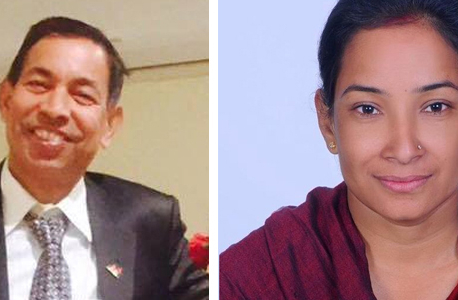
OR
Many in UML, NC doubt effectiveness of alliances
Published On: October 25, 2017 01:06 AM NPT By: Roshan Sedhai
KATHMANDU, Oct 24: A majority government seems well within the reach of the newly-formed left alliance. It is something even the staunchest Nepali Congress supporter can't easily rule out, given the strong performance of the left parties in the recently held local polls.
Out of the 744 local units in the country, the main opposition CPN-UML and CPN (Maoist Center) had won 400 in the polls held in three phases.
With smaller parties on board the UML-Maoist alliance, leaders claim that the left is headed for a 'super majority' in the upcoming elections of parliament and provincial assemblies.
But both UML and CPN (Maoist Center) have remained doubtful all along of the effectiveness of the alliance. Skeptics in both parties are putting a series of questions to their leadership: What is the guarantee that the alliance will consolidate the left votes? What if it disenchants left voters? Let's say it did help consolidate the left votes, but what is the guarantee that the votes will proportionately benefit all parties?
Skeptics in both parties say their fears are based on reality. A group of them, mainly from UML, argue that there are three strong reasons to doubt the effectiveness of the alliance.
First, they argue that the turbulent relationship between UML and Maoist cadres on the ground is likely to alienate many voters. UML cadres had become the major target of the Maoists during the insurgency. The parties have always seen each other as main rivals, mainly given the same vote base that they share.
Secondly, they argue that the alliance and the sudden announcement of unification have dampened the spirit of many committed leaders who were hoping to get tickets for the elections. They said it has already wrecked havoc on party organization and triggered defections.
Third, they claim that there might be significant reductions in the number of left votes as Nepali Congress support had been crucial in the Maoist Center's performance. They said a large chunk of Maoist votes will go to the NC.
There is another group of people within both parties who remain optimistic about better results but harbor doubts that it will benefit all the parties.
Second-rung leaders of UML have long been accusing the party leadership of offering a far bigger share to the Maoists than the former rebel party deserves, in order to break the NC-Maoist alliance. Following strong opposition within the party, the UML leadership on Monday announced that the 60:40 partnership would be reviewed after the first phase elections slated for November 26.
Maoist Center has been accusing UML of using the party as 'a dumping site', giving out constituencies that are difficult to win.
Skepticism runs equally deep in the NC-led alliance which was formed to counter the left. The NC-led alliance, which was formed at NC's behest, includes Madhesi and royalists. The alliance has a strong support base in the terai and the eastern and far western regions and might prove successful in stopping the advance of the left, the more so after the merging of the Bijay Gachchhadar-led Nepal Loktantrik Forum into the NC earlier this year.
The alliance, despite its potential to counterbalance the left, has turned out to be a costly deal for NC. In order to keep Madhesi and royalist parties on its side, NC was forced to give 14 seats Rastriya Prajatantra Party and Rastriya Prajatantra Party Democratic and few seats to Federal Socialist Forum Nepal.
In terms of seat sharing, smaller parties look the most satisfied lot. Can these high stakes in seat sharing change their fortunes? One will have to wait until the election results.
You May Like This

NC mulls poll alliances to isolate UML in Province 2
KATHMANDU, Sept 5: The Nepali Congress (NC) has expedited talks with partners in the ruling coalition to form a strategic alliance... Read More...

NC, UML vie for poll alliances
KATHMANDU, Aug 31: The ruling Nepali Congress (NC) and the main opposition UML have separately reached out to CPN (Maoist Center)... Read More...

Vote count in Bharatpur metropolis: UML wins in 10, NC in 4, UML still takes lead at mayoral level
CHITWAN , May 23: Vote count has been over in 10 of a total of 29 wards in Bharatpur Metropolitan... Read More...




Just In
- Kushal Dixit selected for London Marathon
- Nepal faces Hong Kong today for ACC Emerging Teams Asia Cup
- 286 new industries registered in Nepal in first nine months of current FY, attracting Rs 165 billion investment
- UML's National Convention Representatives Council meeting today
- Gandaki Province CM assigns ministerial portfolios to Hari Bahadur Chuman and Deepak Manange
- 352 climbers obtain permits to ascend Mount Everest this season
- 16 candidates shortlisted for CEO position at Nepal Tourism Board
- WB to take financial management lead for proposed Upper Arun Project






_20220508065243.jpg)








Leave A Comment